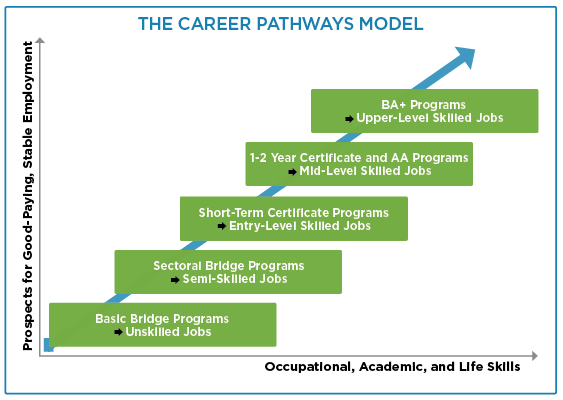Career Pathways Program - Workforce Development & Adult Learning
Learn more about the outcome of Maryland's Career Pathways grant program!
 What is a Career Pathway?
What is a Career Pathway?
A career pathway is a combination of rigorous and high-quality education, training, and other services that:
- Aligns with the skill needs of industries in the economy of the state or regional economy involved;
- Prepares an individual to be successful in any of a full range of secondary or postsecondary education opportunities, including apprenticeship registered under the National Apprenticeship Act (29 U.S.C. 50 et seq.);
- Includes counseling to support an individual in achieving the individual’s education and career goals;
- Includes, as appropriate, education offered concurrently with and in the same context as workforce preparation activities and training for a specific occupation or occupational cluster;
- Organizes education, training, and other services to meet the particular needs of an individual in a manner that accelerates the educational and career advancement of the individual to the extent practicable;
- Enables an individual to attain a secondary school diploma or its recognized equivalent, and at least one recognized postsecondary credential; and
- Helps an individual enter or advance within a specific occupation or occupational cluster.
Why is the Career Pathways Program important?
Literacy, numeracy, and English language requirements often make it challenging for adult learners to access occupational training opportunities. Historically, educational prerequisites have prevented this group from enrolling in job preparation courses due to requirements related to minimum levels of academic proficiency. The career pathways developed through this project will create integrated education and training opportunities that ensure accelerated access to industry credentials and work opportunities for adult learners.

Maryland’s Career Pathway Connections for Adult Learners Program
Workforce training programs designed using the Career Pathways model expedite the process of preparing adult learners for careers by co-enrolling participants in WIOA Titles I and II by providing concurrent and contextualized education and training. These programs emphasize assessment, academic and non-academic supports that adults need to complete their programs, and connections to employers.
Career Pathways programs across the nation are demonstrating the effectiveness of the model in helping educationally underprepared adult learners advance over time to successively higher levels of education and employment.
To expand use of the Career Pathways model and increase co-enrollment in WIOA Titles I and II, MD Labor launched the competitive Career Pathways grant program in 2018. Demonstration project proposals were solicited from local partners with the objective of increasing co-enrollment in WIOA Titles I and II.
Program Goals and Implementation Strategies
MD Labor developed the Career Pathways Program with the following goals in mind:
- Increase WIOA Title II adult learners’ access to WIOA Title I training and career opportunities;
- Focus on meeting lower-level adult learners where they are in education-level and support them in meeting career goals;
- Address the needs of businesses;
- Expand career pathways through piloting one or more proven interventions;
- Support the creation of a Maryland WIOA Co-Enrollment and Career Pathways Guide to facilitate the distribution of information related to best practices, successes, challenges, and more; and
- Achieve sustainability once grant funds are exhausted or the project has ended through connecting to the Maryland Eligible Training Provider List or by other means.
To ensure proposed projects were based on proven best practices, MD Labor provided applicants with a menu of implementation strategies. Pilot projects were required to include one or more of the following interventions:
- Registered Apprenticeship
- Pre-Apprenticeship
- Integrated Education and Training (IET)
- Integrated English Literacy and Civics Education (IELCE)
- English Language Acquisition Out-of-School Youth Pathways
- Distance Learning
- Transition Specialist Support
- Bridge Program
Grant Awards
MD Labor solicited applicants for up to $250,000 in funding to develop innovative demonstration projects with a consortium of local partners, including local Workforce Development Areas (Local Areas), adult education providers and business partners. Most of Maryland’s Local Areas applied for the funding. The state ultimately conducted three grant award cycles and selected seven career pathway projects from five Local Areas. Two of the five won grant awards in multiple grant cycles. The total awards are shown in the map above. The awards by grant cycle are listed in the table below:
Awards for the Three Grant Cycles
Round 1 Awards |
Round 2 Awards |
Round 3 Awards |
· Baltimore City Mayor’s Office of Employment Development (MOED) |
· Anne Arundel Workforce Development Corporation (AAWDC) |
· AAWDC |
State Outcomes
The table below displays statewide performance outcomes for the Career Pathways grant as of March 31, 2022.
|
State Total |
State Goal |
% Goal Achieved |
# Served |
190 |
179 |
106% |
# Co-enrolled in Career Pathways Projects and Title I |
190 |
179 |
106% |
# Completing Training |
123 |
149 |
83% |
# WIOA Approved Certificates and Certifications |
87 |
149 |
58% |
Placement into Employment Following Training Completion (80% of Completers) |
118 |
118 |
100% |
Of those placed into employment following training completion, are Employed QTR2 following Program Exit |
66 |
95 |
69% |
